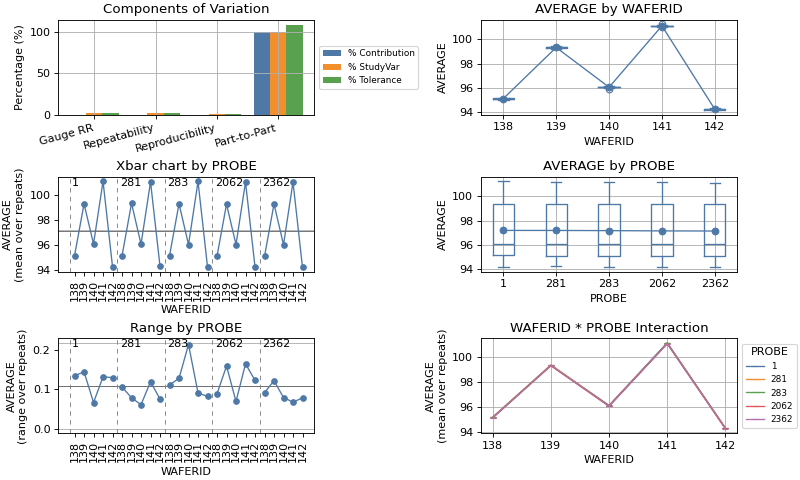grr#
- mqr.plot.msa.grr(grr, axs, sources=None)#
GRR summary plots.
A 3 by 2 grid of:
bar graph of components of variation,
measurement by part,
R-chart by operator,
measurement by operator,
Xbar-chart by operator, and
part * operator interaction.
This routine flattens the axes before drawing into them.
- Parameters:
- grrmqr.msa.GRR
GRR study.
- axsnumpy.ndarray
A 3*2 array of matplotlib axes.
- sourceslist[str], optional
A list of components of variation to include in the bar graph (optional).
Examples
Create plots for a GRR analysis from the NIST silicon wafer resistivity. Data is from https://www.itl.nist.gov/div898/software/dataplot/data/MPC61.DAT.
Before creating the plot, though, there is a bit of data marshalling to do. This loads the data from the CSV file online into a DataFrame. The first 50 rows are metadata etc., so skip those. Treat any one or more whitespace characters as a separator. And finally, add a column assigning numbers to repeated measurements, which allows the GRR routines to include repeats in the linear model.
columns = ['RUNID', 'WAFERID', 'PROBE', 'MONTH', 'DAY', 'OPERATOR', 'TEMP', 'AVERAGE', 'STDDEV',] dtype = { 'WAFERID': int, 'PROBE':int, } data = pd.read_csv( 'https://www.itl.nist.gov/div898/software/dataplot/data/MPC61.DAT', skiprows=50, header=None, names=columns, sep='\\s+', dtype=dtype, storage_options={'user-agent': 'github:nklsxn/mqr'} ) data['REPEAT'] = np.repeat([1,2,3,4,5,6,7,8,9,10,11,12], 25)
The GRR plots are created from a GRR study object
mqr.msa.GRR. For this example, use a tolerance of 8 ohm cm, and test for variance contribution from the probe (listed as operator). The name mapping shows the setup. This study uses only the first run RUNID == 1.tol = 2*8.0 names = mqr.msa.NameMapping( part='WAFERID', operator='PROBE', measurement='AVERAGE') grr = mqr.msa.GRR( data.query('RUNID==1'), tolerance=tol, names=names, include_interaction=True) fig, axs = plt.subplots(3, 2, figsize=(10, 6), layout='constrained') mqr.plot.msa.grr(grr, axs=axs)
(
Source code,png,pdf)